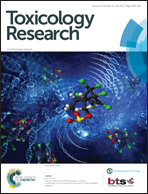Eugenia uniflora leaf essential oil promotes mitochondrial dysfunction in Drosophila melanogaster through the inhibition of oxidative phosphorylation
Abstract
Eugenia uniflora L. (Myrtaceae family) has demonstrated several properties of human interest, including insecticide potential, due to its pro-oxidant properties. These properties likely result from the effects on its mitochondria, but the mechanism of this action is unclear. The aim of this work was to evaluate the mitochondrial bioenergetics function in Drosophila melanogaster exposed to E. uniflora leaf essential oil. For this, we used a high-resolution respirometry (HRR) protocol. We found that E. uniflora promoted a collapse of the mitochondrial transmembrane potential (ΔΨm). In addition the essential oil was able to promote the disruption of respiration coupled to oxidative phosphorylation (OXPHOS) and inhibit the respiratory electron transfer system (ETS) established with an uncoupler. In addition, exposure led to decreases of respiratory control ratio (RCR), bioenergetics capacity and OXPHOS coupling efficiency, and induced changes in the substrate control ratio. Altogether, our results suggested that E. uniflora impairs the mitochondrial function/viability and promotes the uncoupling of OXPHOS, which appears to play an important role in the cellular bioenergetics failure induced by essential oil in D. melanogaster.



 Please wait while we load your content...
Please wait while we load your content...